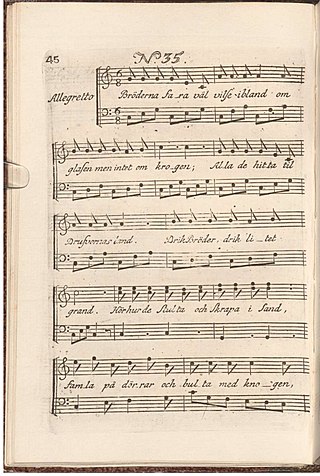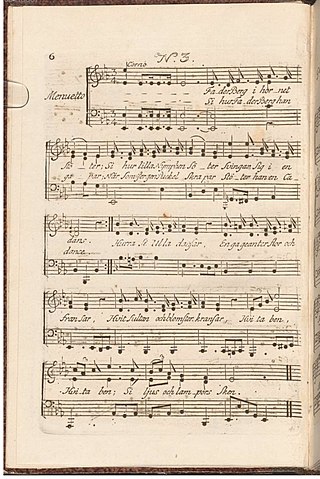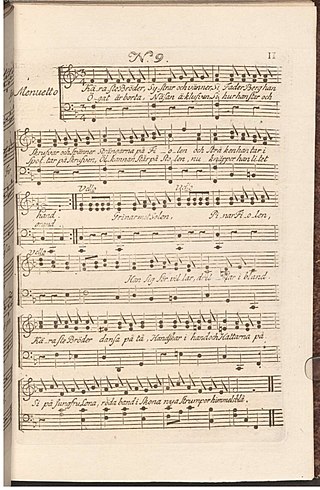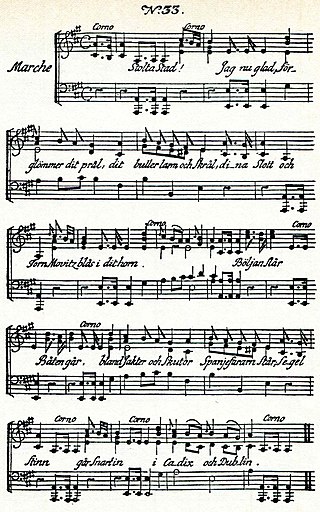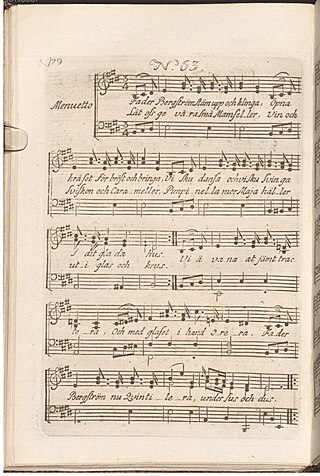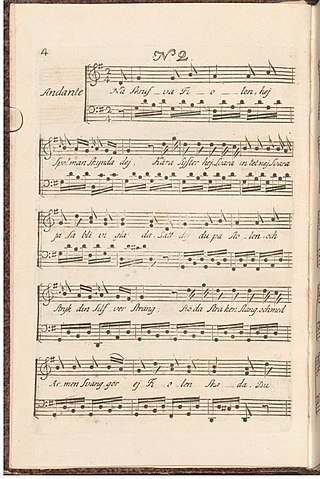| Number | First line | Dedication | Theme | Mortals | Immortals | Location, notes |
|---|
| 1 | Gutår, båd natt och dag [ sv ] | Til Cajsa Stina | Drink | Cajsa Stina, Jergen Puckel, Benjamin Schwalbe, Eric Bergström, Anders Wingmark, broder Berg, Christian Samuel Bredström | | |
| 2 | Nå skruva Fiolen | Til Fader Berg, rörande Fiolen | Tavern, Fiddle | Fader Berg, Fredman | Bacchus | |
| 3 | Fader Berg i hornet stöter | Til en och hvar af Systrarna, men enkannerligen till Ulla Winblad | Wine, Women, Song, Horn | Fader Berg, Jergen Puckel, Ulla Winblad | Charon, Paris, Helen, Freya | Introduces Ulla Winblad |
| 4 | Hej Musikanter ge Valdthornen väder | Enkannerligen till Anna Stina | Wine, Women, Song | Anna Stina | Bacchus, Freya | |
| 5 | Käre bröder, så låtom oss supa i frid | Til de trogne Bröder på Terra Nova i Gaffelgränden | Drink, Companions | | Bacchus | Terra Nova Tavern in Gaffelgränden by Skeppsbron |
| 6 | Käraste Bröder Systrar och Vänner | Til de Galimater på hinsidon den Konungsliga Djurgårdenom | Wine, Women, Song | Ulla Winblad | | Djurgården |
| 7 | Fram med basfiolen, knäpp och skruva | Som synes vara en Elegie, skriven vid Ulla Winblads säng, sent om aftonen | Muse | Ulla Winblad, Fader Berg | Freya | |
| 8 | Dörrarna öpna, Fiolerna klara! | Til Corporal Mollberg | Wine, Women, Song | Mollberg | | Introduces Mollberg |
| 9 | Käraste Bröder, Systrar och Vänner | Till gumman på Thermopolium Boreale | Wine, Women, Song | Fader Berg, Jergen Puckel, Jungfru Lona | Bacchus | |
| 10 | Systrar hören min musik | Klingar väl vid flöjttraver | Wine, Women, Song | | Bacchus, Cupid | |
| 11 | Hej! sade Fredman hvar gång han hörde Valdthorn börja skråla | Til Bröderne och Systrarna på Lokatten | Wine, Women, Song | Ulla Winblad | Cupid | Lokatten (Lynx Tavern)
Begins "Portugal, Spanien,/ Stora Britannien" |
| 12 | Gråt Fader Berg och spela | Elegi öfver slagsmålet på Gröna Lund | Drink, violence | Jergen Puckel | | Gröna Lund (The Greenwood Tavern) |
| 13 | Nå ä nu alla församlade här | Till Brodern Bredström | Drink, Companions | Bredström brothers, Anders Wingmark, Benjamin Schwalbe, Jergen Puckel | Cupid | |
| 14 | Hör J Orphei Drängar | Till poeten Wetz | Drink, Companions | "Orpheus's servants" | Apollo, Bacchus, Cupid, Venus/Freya | |
| 15 | Käraste min Theophile | Enkannerligen til Theophilum Skomakar-Gesäll, under dess förföljelse skrifven til tröst och hugsvalelse | Drink, Companions | Theophile | Bacchus | |
| 16 | Fader Bergström fingra ditt Oboe, blås | Enkannerligen til de Birfilare på den Konungsliga Djurgården | Drink, Companions | Fader Bergström, Cajsa | | Djurgården |
| 17 | Systrar och Vänner | Til Syster Lisa | Drink, Companions | Lisa, Jergen Puckel | | |
| 18 | Gubbarna satt sig at dricka | Til Gubbarna på Terra Nova i Gaffelgränden vid Skeppsbron | Drink, Companions | Jergen Puckel, Benjamin | | Terra Nova Tavern in Gaffelgränden by Skeppsbron |
| 19 | Trumslagarn kommer, flickor god dag! | Til Systrarna på den Konungsliga Djurgården | Wine, Women, Song | Fader Berg | | Djurgården |
| 20 | Står du och gråter? | Til Fader Berg och Jergen Puckel | Dance | Fader Berg, Jergen Puckel | Bacchus | |
| 21 | Skyarna tjockna | Varutinnan han 1:0 avmålar natten med dess nöjen, 2:0 tyckes liksom för ögonen ställa ett slags aequilibrium emellan vinets och kärlekens styrka, men omsider ljusligen uppenbarar övervikten | Wine, Women, Song | Fader Berg | | |
| 22 | Glasen darra mellan knogen [ sv ] | Til de Nybyggare på Gröna Lund | Drink | | | Gröna Lund (The Greenwood Tavern) |
| 23 | Ack du min Moder! | Som är ett soliloquium, då Fredman låg vid krogen Kryp-in, gent emot bankohuset, en sommarnatt år 1768 | Drink | Fredman | | Krogen Kryp-In (The Crawl-in Tavern), Järntorget 85, Gamla stan |
| 24 | Kära Syster! | Till kära mor på Bruna Dörren | Drink | | Bacchus | Bruna Dörren (The Brown Door Tavern) |
| 25 | Blåsen nu alla | Som är ett försök till en pastoral i bacchanalisk smak, skriven vid Ulla Winblads överfart till Djurgården | Pastorale | Ulla Winblad | Neptune, Venus/Freya, Zephyrs, water nymphs, Tritons, Palaemon | Water crossing to Djurgården |
| 26 | Hvar står Fiolen? | Rörande mutter Berg och angående Lotta i Kolmätargränden och vad som passerat | Drink, Violence | mutter Berg, Lotta | |
| 27 | Gubben är gammal, urverket dras | Som är dess sista tankar | Drink, Death | Movitz | Bacchus, Freya | |
| 28 | I går såg jag ditt barn, min Fröja | Om ett anställt försåt emot Ulla Winblad | Muse | Ulla Winblad | Freya, Themis | Yxsmedsgränd |
| 29 | Movitz tag dina pinnar | Till de förnäma | Loss | Movitz | Freya | |
| 30 | Drick ur ditt glas, se Döden på dig väntar [ sv ] | Till fader Movitz, under dess sjukdom, lungsoten. Elegi | Drink, Death | Movitz | Bacchus, Freya | |
| 31 | Se Movitz, hvi står du och gråter | Över Movitz, då han blev uppiskad på gatan, för det kvinten sprang på basfiolen, en sommarafton 1769 | Violence | Movitz | | |
| 32 | Kors! utan glas, du ser ut, din Canalje | Till fader Movitz, varutinnan han liknar honom vid ett skepp | Drink | Movitz | | |
| 33 | Was ist das? / Stolta Stad! | 1:0 Om fader Movitz' överfart till Djurgården och 2:0 om den dygdiga Susanna | Life | Movitz | | Djurgården |
| 34 | Ack hvad för en usel koja! [ sv ] | Till Movitz, när elden var lös i hans kvarter uti Kolmätargränden | Disaster | Movitz | Charon, Themis | Kolmätargränden |
| 35 | Bröderna fara väl vilse ibland | Angående sin sköna och hennes obeständighet | Loss | Movitz | Freya | |
| 36 | Vår Ulla låg i sängen och sov | Rörande Ulla Winblads flykt | Muse | Ulla Winblad | Apollo, Astrild, Bacchus, Freya | |
| 37 | Mollberg, stå stilla, stå stilla vid grind | Till Mollberg på post vid Kungsträdgården | Music, Life | Mollberg, Bergström | Flora, Orpheus | Kungsträdgården |
| 38 | Undan ur vägen | Rörande Mollbergs paradering vid korporal Bomans grav | Death | Mollberg, Christian Wingmark, Corporal Boman | | |
| 39 | Storm och böljor tystna ren | Öfver Bergströmskans Porträt på Liljans krog | | | | |
| 40 | Ge rum i Bröllops-gåln din hund! | Angående bröllopet hos Bensvarvars | Wine, Women, Song | Movitz | | A chaotic wedding at Bensvarvars [10] |
| 41 | Mollberg satt i paulun | Vid et tilfälle då Christian Wingmark miste sin nattkappa i Slagsmålet med Mollberg | Drink, Violence | Christian Wingmark, Mollberg | | |
| 42 | Ren Calas jag spår och tror | Rörande Kortspelet på Klubben | Cards | Mollberg, mor Wingmark, Ulla Winblad | | The club, Mälaren |
| 43 | Värm mer Öl och Bröd | Til Ulla Winblad, skrifven vid et ömt tilfälle | Muse | Ulla Winblad | Astrild | The birthing-room |
| 44 | Movitz helt allena | Öfver Bredströmskans och Movitz melancholi | Wine, Women, Song | Movitz | Astrild, Bacchus, Chloris, Freya | |
| 45 | Tjenare Mollberg, hur är det fatt? | Till fader Mollberg rörande hans harpa | Drink, Violence | Mollberg | Apollo, Bacchus, Maecenas, Venus | |
| 46 | Undan ur vägen, ge rum för Courirn | Huru Mollberg skal bjuda til begrafning efter Mutter på Krogen Wismar, och om hans avfärd ifrån Sterbhuset | | Mollberg | | Wismar Tavern |
| 47 | Kommer intet Mollberg? Jo nyss på stund | Angående Mollbergs återkomst til Sterbhuset på Krogen Wismar | | Mollberg | | Wismar Tavern |
| 48 | Solen glimmar blank och trind | Hvaruti afmålas Ulla Winblads hemresa från Hessingen i Mälaren en sommarmorgon 1769 | Pastorale | Ulla Winblad, Movitz | Neptune | Lake Mälaren back to Stockholm |
| 49 | Mamsell Ulla, märk Mamsell | Angående Landstigningen vid Klubben i Mälaren en sommar-afton 1769 | Pastorale | Ulla Winblad, Mollberg | Bacchus | The club, Mälaren |
| 50 | Phoebus förnyar | Om des sista Ögnekast på Ulla Winblad vid Hännes återfart ifrån Djurgården | Pastorale, Rococo | Ulla Winblad, Movitz | Jupiter, Neptune, Pan, Cupids, Freya | Return from Djurgården |
| 51 | Movitz blåste en Concert | Angående Concerten på Tre Byttor | Wine, Women, Song | Movitz, Ulla Winblad, Wingmark, Bergström, Berg | Eol, Neptune, Orpheus | Tre Byttor Tavern |
| 52 | Movitz, mitt hjerta blöder! | Til Movitz när hans Fästmö dog. Elegie | Death | Movitz, his wife Charlotte | Cupid, Freya | |
| 53 | Vid et stop Öl och några Supar | Angående Slagsmålet nedanför Danto-Bommen hos T. en höstnatt | Drink, Violence | | | Near the Danto Barrier |
| 54 | Aldrig en Iris på dessa bleka fält [ sv ] | På St. Cathrina Kyrkogård | | Corporal Boman, Movitz | Flora | St. Catherine's Churchyard |
| 55 | Så ser Han ut midt bland de strålar | Rörande Movitz Kägelspel hos Faggens vid Hammarby-Tull en sommar afton 1770 | | Mollberg | Faggens Tavern by Hammarby Toll |
| 56 | Se Mollberg med svart Råck och Flor | Angående Mor Maja på Förgylda Bägaren | | Mollberg, Movitz | Astrild, Clotho, Freya | Golden Beaker Tavern |
| 57 | Allting är rigtigt clareradt och gjordt | Om Barnsölet | | Mollberg | | |
| 58 | Hjertat mig klämmer | Öfver Kilberg, Bacchi man och Ordens Officiant i Templet | | | Charon | |
| 59 | Hurra Courage, Bagage! God dag Bröder! | Til Lo-Katten | Drinking | | Freya | Lokatten (Lynx Tavern) |
| 60 | Sitter du ännu och ljuger | Til Bränvins-Advocaten Fader Kulkus om något som passerat | | Cajsa Wingmark | Freya, Themis | |
| 61 | Kära Mor! | Til K. Mor på Fyrkanten | | Movitz | | Fyrkanten Tavern |
| 62 | Movitz Valdthornet proberar | Angående sista Balen på Gröna Lund | | Movitz, Christian Wingmark | Bible: David and Goliath, Ahasuerus, Esther, Noah | Gröna Lund pleasure gardens |
| 63 | Fader Bergström, stäm up och klinga | Diktad midt i veckan | Dance, Drinking | Fader Bergström, Fredman | | |
| 64 | Fäll dina ögon och skäms nu din tåssa | Rörande sista Balen hos Frömans i Horns-Kroken | | Movitz | Freya | Horns-Kroken Tavern |
| 65 | Movitz med flor om armen, hålt! | Om Styrmans-Dottren Gretgens död på Fabriken | | Movitz, Gretgen | Charon, Freya | |
| 66 | Se hvar Movitz sitter där | Til Movitz Målare | | Movitz | Freya, Astrild | |
| 67 | Fader Movitz, Bror! | Til Mutter på Tuppen | Wine, Women, Song | Movitz | Freya | Tuppen (The Cock Tavern) |
| 68 | Movitz, i afton står Baln | Angående sista balen på Grönlund | Wine, Women, Song | Movitz, madam Wingmark | Bacchus, Chloris | Grönlund Tavern |
| 69 | Se Dansmästarn Mollberg, Bröder | Om Mollberg Dansmästare | Dance, Life | Mollberg, Ulla Winblad | | |
| 70 | Movitz vik mössan högt öfver öra | Om något som passerade i Artilleri-Lägret Anno 1773 | | Movitz, Ulla Winblad | | |
| 71 | Ulla! min Ulla! säj får jag dig bjuda | Till Ulla i fönstret på Fiskartorpet | Pastorale | Ulla Winblad | | Fiskartorpet |
| 72 | Glimmande Nymf! blixtrande öga! | Lämnad vid Cajsa Lisas säng, sent om en afton | Muse | Cajsa Lisa | Freya, Jupiter | |
| 73 | Fan i Fauteuillerna! stolarna kullra [ sv ] | Angående Jergen som förskref sig til Fan | Drink, Life | Movitz | | |
| 74 | Min Son! | Om Bergströmskans Porträt | | Movitz | | |
| 75 | Skratta mina barn och vänner | Til sin Rival Fader Movitz, på Cajsa Lisas Namnsdag | | Movitz, Cajsa Lisa | | |
| 76 | Se Hans Jergen hur han sig bockar | Til Mutter på Wismar, rörande Hans Jergen, då han blev utpiskad ifrån Balen | | Hans Jergen | | Wismar Tavern |
| 77 | Klang mina Flickor! se skyarna glimma | Angående Jungfru Sophia på Lokatten och om något som passerat | | Fredman, Mollberg | Bacchus | Lokatten (Lynx Tavern) |
| 78 | Knapt Jeppe hant ur gluggen gå in | som är et Fägne-Spel på Fader Didriks Namnsdag år 1780 | | | | |
| 79 | Charon i Luren tutar | Afsked til Matronorna, synnerligen til Mor Maja Myra i Solgränden vid Stortorget, Anno 1785 | Death | Mor Maja Myra | Charon, Eolus | Solgränden by Stortorget |
| 80 | Liksom en Herdinna, högtids klädd | Angående Ulla Winblads Lustresa til Första Torpet, utom Kattrumps Tullen | Pastorale | Ulla Winblad, Mollberg | Flora, Jupiter | Första Torpet, outside Kattrump Tollgate |
| 81 | Märk hur vår skugga, märk Movitz Mon Frère! | Til Grälmakar Löfberg i Sterbhuset vid Danto bommen | Death | Grälmakar Löfberg, Movitz | Charon | Sterbhuset by Danto Barrier |
| 82 | Hvila vid denna källa | Eller Oförmodade Afsked, förkunnadt vid Ulla Winblads Frukost en sommar-morgon i det gröna | Pastorale | Ulla Winblad, Fredman | Bacchus, Clotho, Charon, Eolus, Freya | |






